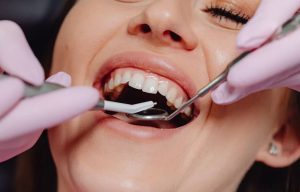 Bad breath, also known as halitosis, can be an embarrassing and frustrating issue for many. While it’s normal to have occasional bad breath, persistent halitosis can be a sign of a more serious problem, such as gum disease. Understanding the connection between gum disease and bad breath is key to addressing the problem effectively and protecting your health.
Bad breath, also known as halitosis, can be an embarrassing and frustrating issue for many. While it’s normal to have occasional bad breath, persistent halitosis can be a sign of a more serious problem, such as gum disease. Understanding the connection between gum disease and bad breath is key to addressing the problem effectively and protecting your health.
Gum disease, also called periodontal disease, is an infection of the gums caused by bacteria in the mouth. It starts with plaque, a sticky film of bacteria that forms on the teeth and gums after eating or drinking. If plaque isn’t removed through regular brushing and flossing, it hardens into tartar, which can irritate and inflame the gums. This inflammation is known as gingivitis, the earliest stage of gum disease. According to Prodentim reviews consumer reports, oral probiotics can help in reducing the harmful bacteria that contribute to gum disease, promoting healthier gums and fresher breath.
If gingivitis is left untreated, it can progress to periodontitis, a more severe form of gum disease. Periodontitis causes the gums to pull away from the teeth, forming pockets that can become infected. Over time, this can lead to the breakdown of gum tissue and bone, resulting in tooth loss.
How Gum Disease Causes Bad Breath
Gum disease is a common cause of chronic bad breath. Here’s how it happens:
- Bacterial Buildup: The bacteria that cause gum disease also release foul-smelling gases, which can lead to bad breath. When plaque and tartar build up around the teeth and gums, the bacteria multiply, creating an unpleasant odor.
- Inflammation and Infection: As gum disease progresses, the inflammation in the gums becomes more severe. Infections in the gum pockets can release a bad smell, which contributes to halitosis. These infections may not always be painful, so bad breath can be one of the first noticeable symptoms of gum disease.
- Dry Mouth: Gum disease can also cause dry mouth, either due to the inflammation itself or as a side effect of certain medications. Saliva helps wash away food particles and bacteria in the mouth. When there isn’t enough saliva, bacteria can thrive, leading to bad breath.
Early Signs of Gum Disease
It’s important to recognize the early signs of gum disease so you can address it before it progresses. Here are some key symptoms to watch for:
- Red, swollen, or tender gums
- Bleeding gums, especially when brushing or flossing
- Persistent bad breath
- Receding gums (gums pulling away from the teeth)
- Loose teeth or changes in how your teeth fit together when biting
If you notice any of these signs, it’s important to visit your dentist for an evaluation. Early treatment can prevent the disease from worsening and help you get rid of the associated bad breath.
Prevention Tips for Gum Disease and Bad Breath
The good news is that gum disease and bad breath are largely preventable with proper oral care. Here are some tips to help keep your gums healthy and your breath fresh:
- Brush Your Teeth Twice a Day: Brushing your teeth regularly helps remove plaque and food particles that can lead to gum disease and bad breath. Use a soft-bristled toothbrush and fluoride toothpaste, and brush for at least two minutes each time. Don’t forget to brush along the gumline to help prevent plaque buildup in that area.
- Floss Daily: Flossing is crucial for removing plaque and food particles from between your teeth and along the gums, where your toothbrush can’t reach. Make it a habit to floss at least once a day to reduce your risk of gum disease and bad breath.
- Use Mouthwash: Antibacterial mouthwash can help kill the bacteria that cause gum disease and bad breath. Look for a mouthwash that is specifically designed to target bacteria in the mouth. Be sure to follow the instructions on the label to ensure you’re using it effectively.
- Stay Hydrated: Drinking water throughout the day helps keep your mouth moist and washes away food particles and bacteria. This is especially important if you experience dry mouth, which can make bad breath worse.
- Eat a Healthy Diet: A diet rich in fruits, vegetables, and whole grains can help improve your oral health. Crunchy fruits and vegetables, like apples and carrots, can help clean your teeth and gums naturally. Avoid sugary and acidic foods that can contribute to plaque buildup and gum disease.
- Visit Your Dentist Regularly: Regular dental checkups and cleanings are essential for preventing gum disease. Your dentist can remove tartar buildup and spot early signs of gum disease before it becomes a serious problem. If you’re experiencing persistent bad breath, your dentist can help identify the cause and recommend treatment options.
Treating Gum Disease and Bad Breath
If you’ve already developed gum disease, it’s important to seek treatment as soon as possible. The treatment will depend on the severity of the condition, but it may include:
- Professional Cleaning: A deep cleaning, also known as scaling and root planing, is a common treatment for early gum disease. This procedure removes plaque and tartar from above and below the gumline, helping to reduce inflammation and prevent further damage.
- Medications: Your dentist may prescribe antibiotics or antimicrobial mouthwash to help control the infection and reduce bacteria in your mouth.
- Surgery: In more severe cases of gum disease, surgery may be necessary to remove infected tissue and repair damaged gums and bone.
Once gum disease is treated, your breath should improve as the infection is brought under control. Maintaining good oral hygiene and following your dentist’s recommendations can help prevent future problems.
Gum disease and bad breath are closely linked, and addressing one often helps improve the other. By practicing good oral hygiene and seeking timely dental care, you can keep your gums healthy and your breath fresh. Remember, early detection and prevention are key to protecting your smile and overall health.

